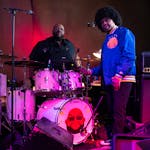"I am old, I am old," cries Falstaff in Theatre Coup d'Etat's "Rogue Prince: Henry IV, Parts I and II," a play very much about aging.
Gary Briggle adapted "Rogue Prince" from the William Shakespeare plays in which Falstaff appears, just as Orson Welles' classic film "Chimes at Midnight" did. Ending with a cliffhanger that tips to events that will take place in "Henry V," Briggle's adaptation focuses on two plot threads: Falstaff confronting mortality while trying to avoid everything that doesn't involve booze or wenches and Henry IV (Bruce Bohne), also dying and preparing to hand the crown to his son at a time when England's relations with Scotland, Wales and France are unsettled.
It's a bare-bones production, seemingly assembled from a couple of swords, a few stools and some dropped-waist pants, but directors Briggle and Wendy Lehr cleverly situate the work in Calvary Baptist Church, which offers two playing spaces for those two threads. Most of the court stuff with Henry IV happens on a small proscenium while, almost as if they're in a different play entirely, most of the Falstaff scenes occur on a semi-thrust that has been created in front of the stage, the audience sitting around it in a "U." It's an extremely intimate setup — I could have picked the pockets of at least four performers — and it forces us to shift our attention between two playing areas. It's an ingenious, spatial way to help us make sense of the bifurcated nature of both "Rogue Prince" and its source material.
The ensemble jells beautifully, many of the actors playing multiple roles, but I was particularly moved by the warmth of Meg Bradley's lament (as Dame Quickly) for Falstaff and by Briggle's Falstaff, who is missed whenever he's not on stage. Briggle lowers his voice and leans in to his character's scandalous behavior, but he also captures the nobility of a man who, rapscallion though he may be, is much loved. Most of the drama in "Rogue Prince" happens on the proscenium and most of the comedy happens on the thrust, but Briggle brings it all together in his final scenes, which the actor addresses to the heavens. ("Rogue Prince" audiences also get to hear Briggle's gorgeous tenor in several choral numbers that help create mood or, in a church scene, a sense of place.)
Perhaps the strength of this ensemble is best shown off in the opening scene, a wordless montage in which the actors wander into the playing space in small groups, animatedly engaging with one another. It's almost like a Robert Altman movie in its sense of a world that refuses to be confined to just one thing and, right when we're settling in, it announces a lot of things to us: Pay attention. There's a lot going on. It's not all about the words. And, most important, some of the people in this play are unscrupulous so we should attend to what they do, not what they say.






